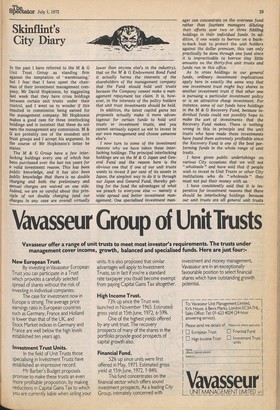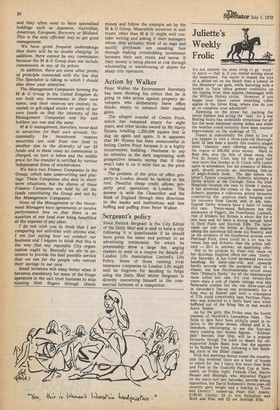Skinflint's City Diary
In the past I have referred to the M & G Unit Trust Group as standing firm against the temptation of warehousing,' but I fear that I have upset the chairman of their investment management company, Mr David Hopkinson, by suggesting last week that they have cross holdings between certain unit trusts under their control, and I went on to wonder if this resulted in commission being earned for the management company. Mr Hopkinson makes a good case for these interlocking holdings and is insistent that these do not earn the management any commission. M & G are probably one of the soundest unit trust groups and I accept his argument. In the course of Mr Hopkinson's letter he states: The M & G Group have a few interlocking holdings every one of which has been purchased over the last ten years for a valid investment reason. This has been Public knowledge, and it has also been Public knowledge that there is no double charging and both the preliminary and annual charges are waived on one side. Indeed, we are so careful about this principle of not double charging (and our -charges in any case are overall virtually lower than anyone else's in the industry), that on the M & G Endowment Bond Fund it actually harms the interests of the shareholders of the management company that the Fund should hold unit trusts because the Company cannot make a management repayment tax claim. It is, however, in the interests of the policy holders that unit trust investments should be held.
In addition, the latest capital gains tax proposals actually make it more advantageous for certain funds to hold unit trusts or investment trusts, and you cannot seriously expect us not to invest in our own management and choose someone else's.
I now turn to some of the investment reasons why we have taken these interlocking holdings. The principal interlocking holdings are on the M & G Japan and General Fund and the reason here is the obvious one that if one of our unit trusts wants to invest 2 per cent of its assets in Japan, the simplest way to do it is through our Japan and General Fund, thereby getting for the fund the advantages of what we preach to everyone else — namely a wide spread and better investment management. One specialised investment man ager can concentrate on the overseas fund rather than fourteen managers diluting their efforts over two or three fiddling holdings in their individual funds. In addition, if one wants to borrow on a backto-bach loan to protect the unit holders against the dollar premium, this can only practically be done through one fund since it is impracticable to borrow tiny little amounts on the thirty-five unit trusts and funds run in this office.
As to cross holdings in our general funds, ordinary investment implications apply here in exactly the same way that one investment trust might buy shares in another investment trust if that other one is pursuing a particular investment policy or is an attractive cheap investment. For instance, some of our funds have holdings in the M & G Recovery Fund, because individual funds could not possibly hope to make the sort of investments that the Recovery Fund makes. There is nothing wrong in this in principle and the unit trusts who have made these investments have found them extremely profitable since the Recovery Fund is one Of the best performing funds in the whole range of unit trusts.
I have given public undertakings on various City occasions that we will not " wholesale" and have said that if people wish to invest in Unit Trusts or other City institutions who do " wholesale " they must not put their money with us.
I have consistently said that it is imperative for investment reasons that there should be interlocking holdings because our unit trusts are all general unit trusts and they often need to have specialised holdings such as Japanese, Australian, American, European, Recovery or Midland. This is the only efficient way to get good management.
We have given frequent undertakings that there will be no double charging. In addition, there cannot be any commission because the M & G Group does not include commission in any of its prices.
In addition, there are some other points of principle connected wtih the line that The Spectator is taking to which I should also draw your attention: The Management Companies forming the M & G Group in the United Kingdom do not hold any investments in their own name, and their reserves are entirely invested in gilt-edged stocks or units of our own funds so that the interests of the Management Companies and the unit holders are one and the same.
M & G management, therefore, never deal in securities for their own account. Occasionally for investment reasons securities are sold from one fund to another due to the diversity of our 35 funds and in these cases no commission is charged, no turn is taken and the middle price for the transfer is certified by various independent firms of stockbrokers.
We have two Finance Companies in the Group, which take underwriting and placings. These Companies also deal in shortterm situations, but the shares of these Finance Companies are held by all the funds constituting the Group and not by the Management Companies.
None of the Management or the Investment Managers have agreements or receive performance fees so that there is no question of one fund ever being benefitted at the expense of any other.
I do not wish you to think that I am comparing our activities with anyone else, I am just saying how we conduct our business and I happen to think that this is the way that any reputable City organisation ought to. Basically we are in existence to provide the best possible service that we can for the people who entrust their savings to our care.
Small investors will sleep better when it becomes mandatory for some of the fringe operators in the unit trust business to stop running their fingers through clients money and follow the example set by the M & G Group. Meanwhile investors in unit trusts other than M & G might well consider writing and asking if their managers whom they probably think of as sage and saintly greyheads are sneaking fees through making crossholding investment between their unit trusts and worse if their money is being placed at risk through wholesaling or warehousing of shares for sharp city operators.
Action by Walker
Peter Walker the Environment Secretary has been showing his critics that he is going to take action against property developers who deliberately leave office blocks empty to enhance their capital gains.
The alleged scandal of Centre Point, which has remained empty for eight years, and other blocks owned by Mr Harry Hyams totalling 1,250,000 square feet is dug up again and again. It is apparent that Mr Hyams has been unsuccessful in letting Centre Point because it is a highly inconvenient building. Needness to say he whistles in the dark negotiating with prospective tenants saying that if they won't take it on it suits him as the price is rising.
The problem of the price of office property in London should be tackled at the root. Plentiful cheap credit allows property pool operations in London. The answer is with the Chancellor and the Bank of England through their directions to the banks and institutions and less huffing and puffing from Peter Walker.
Sergeant's policy Since Patrick Sergeant is the City Editor of the Daily Mail and is said to have a city following it is questionable if he should have given his name and portrait to an advertising testimonial, for which he presumably drew a large fee, urging readers to send in a coupon for details of London Life Association Limited's Life Policy. Some of those running rival insurance companies to London Life might well be forgiven for deciding to forgo using the Daily Mai/ whilst Sergeant is directly concerning himself in the commercial fortunes of a competitor.























































 Previous page
Previous page